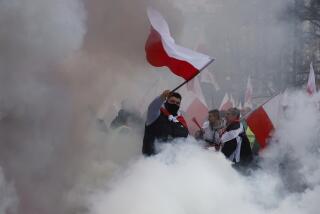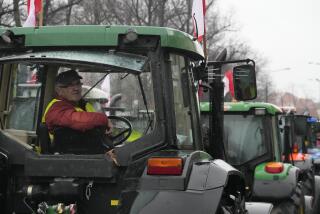How Decades of Soviet ‘Reforms’ Ruined Polish Farms
- Share via
WASHINGTON — Another food crisis in Poland, a tripling and quadrupling of prices, more long lines at grocery stores.
The roots of crisis are in Stalinist policies toward peasants, policies still unchanged. Problems that have accumulated since the end of World War II have never been resolved but only compounded, dead weights on Polish agriculture today. The recent move toward a free market in food is more apparent than real, although it does signal the beginning of new understanding about issues in the countryside. Western countries with a stake in food aid to Poland can also helping achieve a permanent transformation of Poland’s ability to feed itself.
After their takeover following World War II, the communists carried out a “land reform” that gave tiny plots to peasants in order to buy political support, while at the same time nationalizing large estates or giving them to Soviet military units stationed there. The Polish Peasant Party was emasculated and eventually a communist leadership was imposed upon it, renamed the United Peasant Party.
In 1949, Catholic Church land was nationalized and peasant holdings were collectivized. Costs of agricultural products were set by the state, at prices so low that food was virtually free. If the peasant did not turn over his state-set quota, his belongings were confiscated or produce was taken from his house by force. His children were not allowed to attend secondary or higher schools. He had no medical care or retirement insurance. The whole rural infrastructure--slaughterhouses, dairies, mills, brick kilns--was taken over by the communists and 80% destroyed. Rural cooperatives and banks were also dismantled.
The result was famine in Poland in 1954-1955. In June, 1956, workers marched into the streets of Poznan demanding bread and freedom. The resulting riots overthrew the Soviet-appointed Stalinists and installed a regime led by home-grown communist Wladyslaw Gomulka. The collective farms fell apart; peasants took their lands back, starting from scratch--without tools, machinery or farm animals.
Yet the rural infrastructure remained in communist hands. Further, property laws were made so restrictive that people could not buy, sell or exchange land. Every activity in the countryside was controlled by the stifling Communist Party, United Peasant Party and local governments. The regime distributed all the implements necessary for farm production and construction, from agricultural machinery to bicycles. The idea was to coerce the peasants, rewarding compliant ones, punishing rebels.
Throughout the 1960s, agriculture remained the stepchild of a Polish government still overseen by Moscow. The Council of Mutual Economic Assistance, run by the Soviets, decided what country would produce what necessities for the Eastern Bloc. Poland was not assigned the agricultural sector, so it was not producing anything for it. There was a lack of research and development in agriculture, while other countries were experiencing the “green revolution.”
Prices were unfavorable to farmers. There were no medicines for people or for animals, no vitamins or special additives for animal feed.
The big food price increases in 1970 inspired workers’ riots, leading to a new regime led by Edward Gierek. His policies aimed at the creation of a new socialist rural infrastructure. Instead of small enterprises servicing their immediate geographical areas, he built large factories, slaughterhouses and dairies at great distances from the sources of production.
But farmers lacked transportation and storage capacity. In the difficult process of transporting products to far-away destinations, milk spoiled and animals for slaughter lost a third of their weight.
Gierek attempted a new, hidden, collectivization of farms. Laws on retirement for farmers were changed. If a farmer had no immediate heirs, he had to turn over his land to the state in exchange for a retirement pension. The pensions were inadequate and unregulated; a retired farmer became the victim of raging inflation. Meanwhile, many properties taken over by the state--particularly in eastern Poland--were never cultivated and they turned into wasteland.
Gierek’s massive industrialization policy resulted in an ecological catastrophe. Today, water is contaminated; 60% of Poland’s farmers must bring in drinking water--by truck or by horse--for themselves and their animals. There are no irrigation or flood-control systems. Farmland is contaminated by industrial chemicals.
Even as the crisis grew, Gierek tried food exports to the West as payment for the huge loans that he was taking out to modernize Polish heavy industry. At the same time, Poland was ordered to provide food for Warsaw Pact armies. Then more price rises, more strikes and the birth of Solidarity in 1980.
As Solidarity grew, peasants demanded a reversal of discriminatory government agricultural policy. They organized three peasant strikes in 1981--in Rzeszow, Siedlce and Bydgoszcz--to present detailed demands for improving the lot of the farmer. The Rural Solidarity Union was organized to represent peasant interests. Agreements were signed with the communist government to settle the strikes but government promises were never implemented.
When Gen. Wojciech Jaruzelski came to power in late 1981 and declared martial law, the agricultural situation remained unchanged but food in the cities was rationed. Then came the Chernobyl tragedy in 1986 and food shortages were worse; a nuclear accident in the Soviet Union caused a decrease in animal reproduction--especially cows--and a decrease in milk production compounded an already-critical situation.
The Catholic Church had recognized the potential for disaster and in the early 1980s proposed creation of the Agricultural Foundation, which would raise money abroad, investing the funds in rural infrastructure projects that would serve private farmers. The foundation would work with Rural Solidarity organizations attached to local Catholic churches in a substantial segment of the countryside. But the government never let the foundation operate, despite financial commitments from abroad. Grass-roots Rural Solidarity efforts were demolished by the communist-controlled United Peasant Party. Eventually, a much-reduced Agricultural Foundation came into being. Its pilot projects and those of the Rockefeller Brothers Fund at last come to grips with the impoverishment of Polish agriculture.
But the economic “reform” policies of previous governments have overwhelmed even the good news. Government bungling had led to selective price rises, triple-digit inflation and shortages of absolutely everything. For farmers, there was no correlation between the costs of production--machines, electricity or fertilizer--which were rising rapidly and the prices of sold food products, prices set by government. No economic incentives to produce, only political slogans.
The peasant strikes of spring, 1989, were a response to four decades of intolerable conditions on the farm. Without food reserves, the government could not even meet its obligations under the rationing system. So government eliminated them last summer. The new stated policy is a free market in food products. But the free market means little until a realistic food chain is reestablished.
How to do that? First, the communists must accept peasants as equal members of society with a vital function to perform. Second, the rural infrastructure must be rebuilt. Third, the date of free, local government elections must be moved up. Finally, Rural Solidarity should participate in Parliament, with the power to influence decisions affecting small farmers.
Western governments, providing food aid to Poland, should make these points a condition of continuing involvement.
More to Read
Sign up for Essential California
The most important California stories and recommendations in your inbox every morning.
You may occasionally receive promotional content from the Los Angeles Times.













